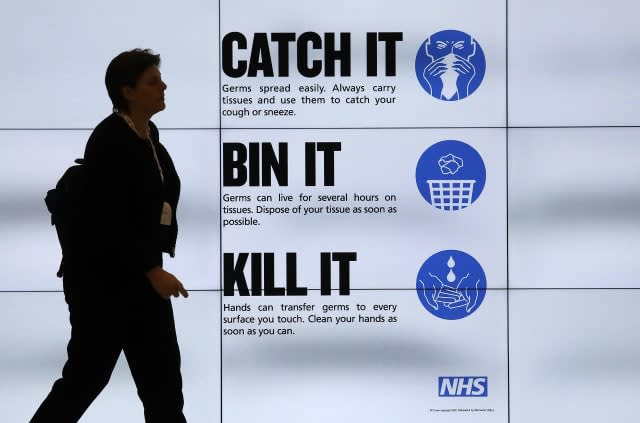Coronavirus pandemic is accelerating – WHO

The coronavirus pandemic is "accelerating", the World Health Organisation has warned.
The global health body said it has now received more than 300,000 reports of Covid-19.
The first 100,000 cases were reported in the first 67 days of the virus, the second 100,000 cases came 11 days later and the next 100,000 cases just came four days after that, it said.
WHO director general Dr Tedros Adhanom Ghebreyesus also said that there were "alarming" reports of health workers getting sick.
He said he would be contacting the G20 heads of state to solve the global shortage of protective gear for health workers.
"More than 300,000 cases of #COVID19 have now been reported to WHO, from almost every country in the 🌍.The pandemic is accelerating.It took 67 days from the 1st reported case to reach the first 100K cases, 11 days for the second 100K & just 4 days for the third 100K"-@DrTedrospic.twitter.com/XoBkVnWtLH
— World Health Organization (WHO) (@WHO) March 23, 2020
Addressing a press briefing in Geneva, Dr Ghebreyesus said: "More than 300,000 cases of Covid-19 have now been reported to WHO, from almost every country in the world.
"The pandemic is accelerating. It took 67 days from the first reported case to reach the first 100,00 cases, 11 days for the second 100,000 and just four days for the third 100,000.
"But we're not prisoners to statistics. We're not helpless bystanders.
"We can change the trajectory of the Covid-19 pandemic.
"Numbers matter, because they're not just numbers. They're people, whose lives and families have been turned upside down.
"What matters most is what we do.
"Asking people to stay home and other physical distancing measures are important to slow down the spread of the coronavirus and buy time, but they're defensive measures.
"To win, we need to attack the coronavirus with aggressive and targeted tactics – testing every suspected Covid-19 case, isolating and caring for every confirmed case, and tracing and quarantining every close contact."

On health workers, he added: "We continue to hear alarming reports from around the world of large numbers of infections among health workers."
"Even if we do everything else right, if we don't prioritise protecting health workers, many people will die because the health worker who could have saved their life is sick.
"WHO has been working hard with many partners to rationalize and prioritise the use of personal protective equipment. Addressing the global shortage of these life-saving tools means addressing every part of the supply chain, from raw materials to finished product.
"Measures put in place to slow the spread of the virus may have unintended consequences by exacerbating shortages of essential protective gear, and the materials needed to make them.
"Solving this problem requires political coordination at the global level. I will be addressing heads of state from the G20 countries. I will be asking them to work together to increase production, avoid export bans and ensure equity of distribution on the basis of need."
Health leaders were also asked about the possibility of a loss of taste and smell being a symptom of Covid-19.
WHO's Dr Maria Van Kerkhove said: "We have seen quite a few reports now about people who are in their early stages of disease may lose their sense of smell, may lose the sense of taste, but this is something that we need to look in to, to really capture to see whether this is one of the signs of Covid-19.
"We have a number of countries that are conducting early investigations where they are capturing standardised information from cases and contacts where they are looking at signs and symptoms."
Meanwhile, the global health body said that it believed a decision would be made about the future of the Tokyo 2020 Olympic Games soon.
Dr Michael Ryan, executive director of WHO's Health Emergencies Programme, said: "The future of the Games is clearly under very close observation at the moment."
He added: "We are feeding into the IOC (International Olympic Committee) and the Japanese government and the Tokyo 2020 Committee's deliberations on this and I believe a decision will be made very soon regarding the future of the Games.
"The decision to postpone the games would be purely a decision of the Japanese Government and the IOC but we are in the process of offering them risk advice.
"As we have said previously, we have every confidence that the Japanese government and the IOC would not proceed with any games should it be dangerous to athletes or spectators."


